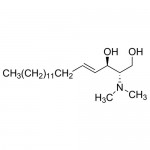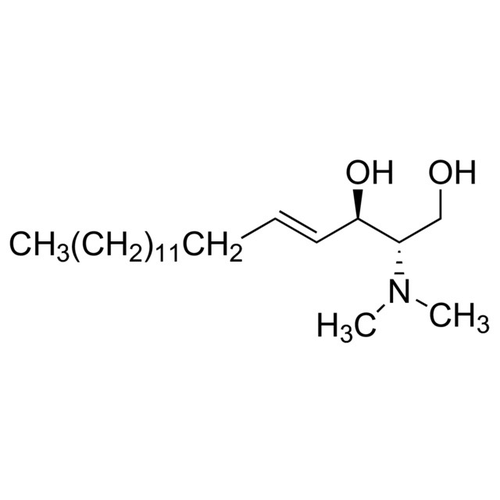| Product Name | N,N-Dimethylsphingosine |
| Description |
Kinase inhibitor |
| Purity | >98% |
| CAS No. | 119567-63-4 |
| Molecular Formula | C20H41NO2 |
| Molecular Weight | 327.6 |
| Field of Use | Not for use in humans. Not for use in diagnostics or therapeutics. For in vitro research use only. |
Properties
| Storage Temperature | -20ºC |
| Shipping Temperature | Shipped Ambient |
| Product Type | Inducer |
| Solubility | Soluble in DMSO (25 mg/ml) or 100% ethanol (25 mg/ml) |
| Source | Synthetic |
| Appearance | White to off-white waxy solid, or viscous oil |
| SMILES | CCCCCCCCCCCCC/C=C/[C@H]([C@H](CO)N(C)C)O |
| InChI | InChI=1S/C20H37NO4/c1-2-3-4-5-6-7-8-9-10-11-12-13-14-15-20(25)19(16-22)21(17-23)18-24/h14-15,17-20,22,25H,2-13,16H2, |
| InChIKey | XPDYLGZWYWKOFM-PPQGUHKJSA-N |
| Safety Phrases |
Classification: Harmful. May be harmful if inhaled, swallowed or absorbed through skin. Safety Phrases: S22 - Do not breathe dust S24/25 - Avoid contact with skin and eyes S36/37/39 - Wear suitable protective clothing, gloves and eye/face protection Risk Phrases: R20/21/22- Harmful by inhalation, in contact with skin and if swallowed |
| Cite This Product | N,N-Dimethylsphingosine (StressMarq Biosciences Inc., Victoria BC CANADA, Catalog # SIH-235) |
Biological Description
| Alternative Names | (2S,3R,4E)-2-(Dimethylamino)-4-octadecene-1,3-diol |
| Research Areas | Apoptosis, Cancer, Cancer Growth Inhibitors, Tyrosine Kinase Inhibitors |
| PubChem ID | 6438166 |
| Scientific Background | N,N-Dimethylsphingosine is a specific inhibitor of sphingosine kinase, an enzyme involved in the production of sphingosine-1-phosphate, a key signaling lipid. In neuroscience, it is used to study the regulation of apoptosis, inflammation, and neurodegeneration through sphingolipid signaling pathways. Its ability to induce apoptosis without affecting protein kinase C makes it a selective tool for dissecting lipid-mediated neuronal processes. |
| References |
1. Yatomi Y., et al. (1996) Biochem. 35: 626-633. 2. Sweeny E.A., et al. (1996) Int J Cancer. 66(3): 358-366. |



Reviews
There are no reviews yet.